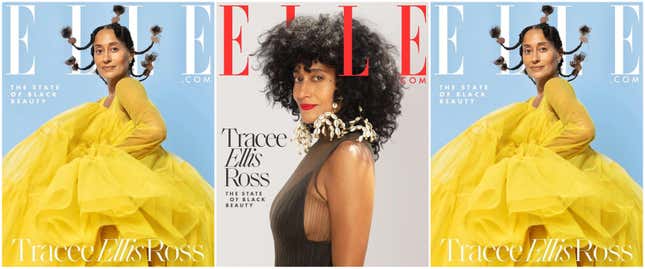
Heads up—if you hadn’t heard, our tresses are trending this month. A number of famous and brilliant women have put their heads together to discuss one of the most specific and polarizing aspects of Black beauty—our hair.
Earlier this week, Glamour magazine debuted their groundbreaking September cover story, which called out the pervasive issue of hair discrimination by featuring an array of differently coiffed Black women and pointedly asking “Was It Our Hair? Or Was It You?” Celebs Gabrielle Union, Uzo Aduba, Keke Palmer, and Marsai Martin added their influence to what Glamour dubbed “the hair issue,” issuing a PSA in which they read aloud 13 women’s experiences of hair discrimination and amplified the CROWN Act (Creating a Respectful and Open World for Natural Hair), which launched in 2019, has thus far been passed in seven states, and is currently campaigning to be passed at the federal level.
Great minds clearly think alike; as it turns out, Elle.com also has Black hair on the brain, and as the focus of its inaugural State of Black Beauty coverage, which stars none other than hair icon-turned-hair entrepreneur Tracee Ellis Ross. Launched Thursday, the new platform is the brainchild of “the Black girl coalition” of Elle Beauty Director Chloe Hall, Assistant Editor Nerisha Penrose, and Webby-nominated producer Angel Lenise; Hall writes that the trio, along with London-based graphic designer Joelle Avelino, “came together to create an editorial package centering the joy and beauty of our communities. The brief was simple: How can we use our platform to spotlight the beauty of Blackness in all its complexity and splendor?”
Of the process, Hall also writes:
As the package came together over the past several months, I realized what made it so special was that it was made for Black people, by Black people. We recorded real women sharing the microaggressions they’ve faced for their hairstyles in corporate America. ... We talked to activists, actresses, politicians, and thought leaders about their personal relationships to beauty.
Of course, the standout amongst these contributors is Ellis Ross, who creative directed her own all-Black, all-female team to create her cover shoot; including photographer Djeneba Aduayom, stylist and costume designer Shiona Turini, her own makeup, and an array of evocative hair looks by Emmy-nominated stylist Araxi Lindsey. The vision was reportedly part of a mandate by the actress “that the resulting art be our vision as Black women, together.”
To that end, the Black woman magic doesn’t stop with the visuals. None other than close friend and fellow actress, producer and advocate Kerry Washington interviews Ellis Ross for the cover story, in which the two discuss intersectional feminism via Kimberlé Crenshaw, the importance of Black female friendships, honoring and sharing power and platforms with the marginalized, self-advocacy, and the birth of Ellis Ross’ less-than-year-old but already cult-favorite haircare brand, Pattern Beauty, saying:
“There was a void, in both seeing ourselves in our natural, authentic beauty, and also having products that would work for us to do our hair naturally—to wear it the way it naturally came out of our heads.”
Ellis Ross’ oft-repeated narrative paraphrases Toni Morrison, in that she created the products she wanted to see in the world, with an ethos to match. Pattern not only produces texture-loving products—and in fact, just dropped a new collection of mini styling tool s and accessories this week ($8-$37), but supports organizations that in turn support women and people of color. As Ellis Ross tells Washington, while Pattern is her baby, she is but another shepherd in supporting the creative ingenuity Black women have always possessed.
“There’s been a real shift,” she says of our current discussion around Black beauty and culturally specific creativity. “And bringing the circle back to Dr. Crenshaw and this idea of the frame—I realize that Black girls have been magic forever, but once we got this term, the world was able to see that magic in a way it wasn’t being received before.
She later adds:
I always remind people, we’ve been here doing this forever. This is not some new phenomenon. Braids are not new. Cornrows are not new. Twists are not new. Bantu knots are not new. If our hair could talk, it would tell you of our legacy. Black beauty is timeless and holds such a story that I am so grateful to be a part of, and to continue allowing it to unfold through me. Black women and our hair have been at the center of social, cultural, political, and economic revolutions and movements through time. We hold so much power in our beauty. Our beauty is filled with love and joy and an emotional intelligence that reaches into spaces that allow us to connect with each other in such sacred ways.
Ellis Ross’ words echo those of Hall, who teases that Elle.com’s exploration into the power of Black beauty will be not only inclusive, but indefinite, writing:
The thing about Black beauty is that it is infinite. There is no limit to the stories that can and should be told. They cannot be contained in a single issue or month in the calendar year. This is our commitment: Black beauty is and will be at the center of everything we do at ELLE.com. We will launch the visuals, stories, videos, audiograms, letters, and covers dedicated to our community. As editors, writers, producers, friends, and sisters, it’s our job to keep telling these stories and using our platform to amplify our stories and the stories of our community.
This is just the beginning.

